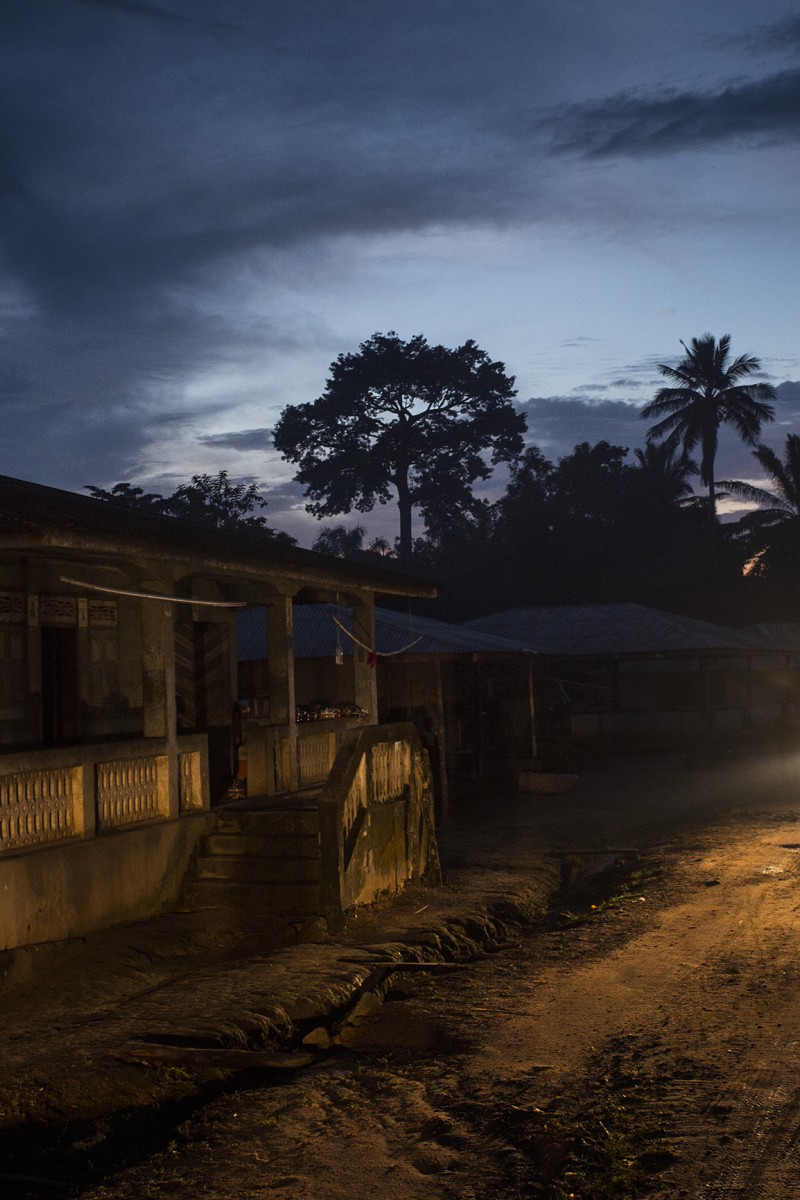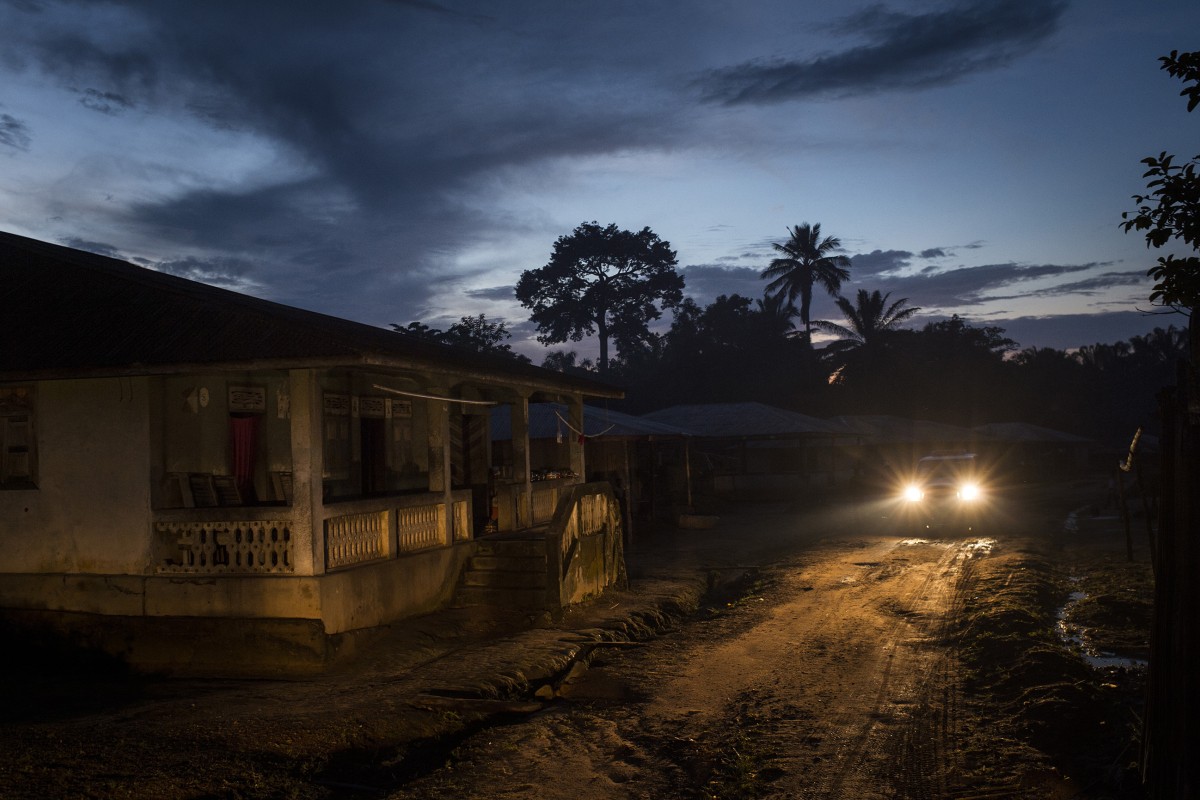
His daughter had just been coaxed into an ambulance bound for the Ebola center. As Foday Kalma watched, his neighbours and relatives crowded around the vehicle, wailing that she was being driven to her death.
 Night falls in Kumala, a remote village in Sierra Leone that is battling Ebola.
Night falls in Kumala, a remote village in Sierra Leone that is battling Ebola. His daughter had just been coaxed into an ambulance bound for the Ebola center. As Foday Kalma watched, his neighbors and relatives crowded around the vehicle, wailing that she was being driven to her death.
Kalma, 43, couldn't bear it. He had already lost his wife and mother-in-law to the disease. Suddenly, to his astonishment, nine-year-old Fatmata jumped out of the ambulance. She dashed to where he was standing with her two siblings. That's when Kalma made a split-second decision that would rattle the region’s medical officlas: He gathered his children and bolted for the jungle.
Another family of possible Ebola carriers was on the run.
Fear and loathing
Six months after the world's largest Ebola outbreak began, experts say one of their biggest challenges is convincing people to trust the medical system. Families still hide suspected Ebola victims or refuse to take them to clinics. The problem exists in Liberia, but some foreign health officials say it's even more daunting in Sierra Leone, where the infection rate continues to climb even as it declines in the neighbouring country.
In rural areas like Koinadugu, a district bordering Guinea, the problem is especially severe. There is no electricity or running water, let alone a modern hospital. Medicine usually means local herbs, generic malaria pills or the advice of a local healer. People whisper that disinfectant spreads the disease rather than kills it.
The influx of foreign health workers in moonsuits has terrified residents. Recently, a villager arrived at the district’s Ebola isolation centre and demanded that his daughter "be taken away from the white people."
Another man with Ebola symptoms climbed a tree to escape a team that wanted to bring him in for treatment. "He's going to starve out there," said John Koroma, one of the "contact tracers" who had been trying for nearly a week to bring him in.
Every day, teams of officials plunged into the jungle, searching for people exposed to Ebola who had fled medical treatment. Officially, 1,583 people have died from the disease in Sierra Leone since May. But authorities suspect entire families have died in the wilderness, before Ebola tests were even taken. Kalma and his children could be next, officials feared.
No one knows how many have died
In Koinadugu, a medical team mobilized. "We need to get that family back," said Konjo Marah, a contract tracer.
Koinadugu is Sierra Leone's largest district, blanketed by thick rain forest. The roads are so bad that blood samples must be flown from far-flung villages by helicopter to be tested for Ebola in labs.
When a sudden outbreak of Ebola in October killed dozens of people, a schoolhouse in Koinadugu was converted into an isolation centre, where suspected Ebola patients could be monitored until their lab results came back.
Outside the schoolhouse on a recent day, health workers frantically planned how to find the Kalma family before they all died or infected others.
"We’ve got to get the contact tracers out there," said Colin Basler, an epidemiologist with the US Centers for Disease Control and Prevention, referring to the teams that monitor the web of people who have interacted with Ebola victims.
But even if they could find the family, getting them to come back would be enormously difficult. Health workers knew that many families here viewed their whole operation with skepticism, and they understood why.
"Their kids are taken away and they don't have any information," said Gisa Kohler, the World Health Organisation's team leader in Koinadugu. "Of course they're not going to trust us."
A few hundred metres away, the community's traditional leader, Paramount Chief Alimamy Foday Jallah, a man who wielded a ceremonial wooden staff from the president, crafted his own plan to get the family out of the jungle. He sent a message to his deputy in Sumbaria, the village where they had disappeared.
"If they're not brought into the care centre," the letter read, "I'm going to suspend you."
What neither Jallah nor the health workers knew was that the family had made it to a tiny hut in the jungle, near a small swath of farmland that Kalma sometimes tended. He told Fatmata, who had a fever and diarrhoea, to lie in one corner. He kept his son, eight, and other daughter, five, who appeared to have no symptoms, on the other side of the room.
"You stay where you are," he told his children.
He went to roast some cassava, a shrub grown here, over a fire. The four of them ate and then slept on the floor.
The loss of his children was the worst thing he could imagine. When his little girl had dashed out of the ambulance, he was so frightened of losing her that he could barely think, he later said.
"I would do anything to stay together," Kalma would say later, describing that night.
A day after Kalma and his children disappeared, a team of contact tracers went to speak to his neighbours in the village, who mentioned his small plot in the jungle.
A group of men hiked through the brush toward the hut. This time, they brought three Ebola survivors who would help them strengthen their message: If you get your daughter early treatment, she can survive.
"It was a new strategy, and we thought it would work," said Marah.
When they finally found Kalma, he was wearing a faded red button-down shirt and gray pants. He was tall and thin and he began almost every sentence by saying "Wellllll . . ." - stretching out the syllable like he was contemplating a grave disclosure.
The survivors, the ambulance driver and the contact tracers took turns lecturing him. Kohler, the only foreign health worker there, was politely told to back away. This was best handled as a local issue.
Going against the rules
The rules forbade families from staying at the isolation centre with their relatives if they didn't have symptoms. But gradually the district was learning that it was more important to build trust than to keep to every Western-style medical standard. The health workers promised Kalma that his entire family could come to the center if he brought his daughter.
Finally, Kalma consented.
"The place for humans is in the village, not in the bush," he later said, recounting his decision. "I couldn't stay out there."
It was a triumph for the health workers, but only a partial one. Kalma still hadn't agreed to let his daughter be taken to an Ebola treatment centre. The closest one was five hours away. And he wouldn't be able to come.
"I guess we keep the girl here, and maybe she makes it," said Sebastian Soulier, an infection prevention and control specialist with the World Health Organisation.
"I'm just happy they came out of the bush," Basler, the CDC epidemiologist, sighed.
For hours, Kalma lay on a bench outside the isolation centre with his two children. Inside, nurses were feeding Fatmata and giving her oral rehydration salts. In front of the centre, soldiers were rolling out a red carpet in preparation for a rare visit from the country’s president, Ernest Koroma.
One after another, officials and health workers came to speak to Kalma. From a distance - in case he, too, was infectious - they tried to persuade him to let his daughter go to the treatment centre.
"It’s your daughter’s best chance at survival," said Francis Moses, the district medical officer.
"The government will take care of your family if something happens," Fiseneh Samora, the district coordinator, said obliquely.
Kalma nodded each time, but he did not appear convinced. The situation had grown urgent. Fatmata had been vomiting and her body had grown weak. Without immediate treatment, her chances of survival were slim.
Slim chance of survival
"I’m still afraid I will lose all of them," Kalma told Moses, referring to his family members. But suddenly, he decided that he would let his nine-year-old go. He looked like a man tired of fighting authorities.
"I believe in the health-care workers, and I believe in God," he pronounced.
A few hours later, an ambulance arrived. Kalma put on medical gloves and rain boots. "You need to go with these people to be healthy again," he told his daughter.
Health workers wearing protective suits helped her into the ambulance, and it roared down the dirt road.
It looked like a victory for the medical professionals. Indeed, not only had Kalma allowed his daughter to go, but he had agreed to Ebola tests for himself and his other two children. Still, the health workers worried about what would happen if Fatmata died.
Would Kalma lose whatever trust he had gained in the medical system? Would that loss of faith be passed on to the rest of the community?
"Right now this looks like a step forward," Soulier said. "But if the girl dies, it.s 10 steps back."